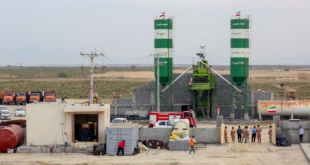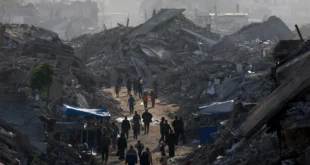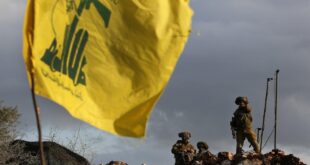The prosecution file in a case of alleged electoral fraud in a remote Albanian region in 2016 lays bare an industrial-scale campaign of vote-buying and intimidation up and down the ranks of the country’s ruling Socialist Party. As yet, no one has faced justice.
On September 13, 2016, two days after Albania’s ruling Socialist Party won a mayoral election in the remote northern region of Dibra, local police chief Robert Aga received word that an amateur cameraman was on his way to the capital, Tirana, with compromising video that he planned to deliver to one of the country’s major TV channels.
Aga ordered that the man, travelling in a Mercedes Benz, be stopped.
“There’s something – material – that we do not want him to send to Tirana,” Aga told his officers, according to a recording of him made by prosecutors investigating claims of electoral fraud. The man, however, evaded their grasp.
The video, aired by Klan TV, showed voters being offered money in the Dibra village of Kllobcisht. It was not the only case that election day.
According to the investigation file seen by BIRN, prosecutors have identified a total of 96 instances in which votes were bought for the Socialist Party candidate and eventual winner, Muharrem Rama.
Threats and blackmail were also rife, according to the prosecutors’ findings. They provide a worrying snapshot of the underhand tactics being employed in elections in the NATO member state, and raise fresh questions about the effectiveness of the Albanian judicial system even after a long-awaited overhaul.
Thanks to a long-running dispute over jurisdiction between serious crime prosecutors in Tirana and local prosecutors in Dibra, charges of election fraud only reached court on December 18 last year, four years after the alleged crimes took place. Due to the time elapsed, some of the accused will not face trial.
Case held up by prosecutorial row over jurisdiction
The post of Dibra mayor came up for grabs in 2016 after the previous Socialist incumbent, Shukli Xhelili, was dismissed and then arrested after being filmed asking for sex from a municipal employee in return for raising her pay.
Xhelili had been elected in 2015 by a narrow margin, but the Socialists allied with another party – the Justice, Integration and Unity Party, PDIU – the following year and took the town again, this time with some 4,000 more votes over their nearest rivals.
The opposition cried foul and the Serious Crime Prosecution in Tirana launched an investigation that involved, among other things, extensive phone taps.
In January 2019, more than two and half years after the election, a joint investigation by BIRN and the Albanian service of Voice of America revealed the involvement of organised crime groups in a number of Socialist Party electoral campaigns, including in Dibra.
The following month, the main opposition Democrats relinquished their parliamentary mandates and called on Socialist Prime Minister Edi Rama, who featured in wiretaps obtained by German tabloid BILD, to resign. Protests followed, sometimes turning violent. The Democrats refused to take part in local elections that year.
Yet despite its political importance, File No. 184, the electoral fraud case, was going nowhere fast, bounced back and forth between one team of prosecutors and another.
In July 2019, the Serious Crime Prosecutors in the capital decided to transfer the file to the local prosecution in Dibra, but BIRN has learned that the Dibra team refused the case, citing conflicts of interest. Then General Prosecutor Arta Marku intervened, ordering Dibra to take on the case.
Then in 2020, the Dibra prosecutors sought to hand the file off to the successor to the Serious Crime Prosecution, the Special Structure Against Corruption and Organised Crime, or SPAK, which was created in 2019 as part of an overhaul of the justice system.
SPAK, however, rejected Dibra’s characterisation of the case as one of an “organised criminal structure” and refused the file. Two Dibra prosecutors then resigned and the Dibra prosecution finally sent the file to court, more than four years after the investigation was launched.
Widespread vote-buying
According to the findings of the investigation seen by BIRN, police chief Aga’s failed attempt to stop the video from being aired was not the only intervention in support of the Socialists in Dibra.
Taped conversations revealed an organised effort to halt buses bringing Democrat supporters from Tirana the day before the election to their native villages in Dibra, where they were registered to vote, and to convince them to vote Socialist.
“About 30 of them were turned to us while the rest was blocked,” an unidentified voice is heard telling a man identified by prosecutors as Afrim Mikli, the head of the Socialist Party branch in Dibra. “The trouble is, the price has gone up,” prosecutors quote the unidentified caller as saying. Mikli asks how much he needs, and the person replies, “at least three”, meaning 300,000 leks, or roughly 2,500 euros.
According to the file, the prosecutors believed they had proof of at least 500 votes being bought by the suspects at a price of between 3,000 and 20,000 leks, or 25 to 160 euros. The investigation covered only the last two days before the election.
Some of the conversations revealed collective vote-buying of whole families, sometimes entire villages.
In one, a man identified as Fatbardh Lala informs his brother, Korab Lala – father of Albanian MP Reme Lala – that some 80 people were travelling to the region from Tirana and he needed 500,000 leks, roughly 4,000 euros, for their votes.
Some voters even tried to bargain up the price.
“The old man and I will vote for you, but the rest, the son and his wife, will vote for the others,” a lady named Muce is quoted by prosecutors as telling Hasan Hoti, at the time a local official in the mountainous area of Lura. On offer was 20,000 leks for the family’s four votes. “The other side is offering 20,000 leks per vote,” Muce is quoted as saying. They appear to reach a deal.
The file eventually submitted to court identified Korab Lala – a powerful figure in Albania – as the ringleader, in collaboration with Fatbardh Lala, Afrim Mikli, Ylli Mikli and Nuri Meda. Korab Lala has no known position in the Socialist Party. Prosecutors, however, requested the case against them be dropped due to the statute of limitations expiring.
The investigation sheds no light on where the money for the operation came from, but clearly demonstrates how the funds were moved from the top down to operatives on the ground. Each person who ‘sold’ their vote was obliged to film themselves by mobile phone casting the ballot.
In several taped conversations, prosecutors say that Bekim Krashi, the head of Albania’s national electricity distribution company OSHEE, is heard asking for information about how many votes have been “secured” and seemingly calculating the cost.
Krashi is quoted as discussing the budget he had for each electoral zone in response to a request from a man named Urim for money to buy two more votes.
“I don’t know, I’ve used it all up there,” Krashi says. “I have other zones as well.” Krashi has been charged with “giving rewards and promises to voters,” but the statute of limitations has expired.
Destroy the evidence
Late on election night, as the votes were being counted, the Socialists were exultant.
“We’ve suffocated them,” Krashi is quoted by prosecutors as telling Aga, the Dibra police chief.
News of the investigation quickly leaked, however. On September 14, three days after the election, Korab Lala is taped telling his brother Fatbardh that they are being listened to and that he should burn a notepad. Lala’s wife calls, telling him the same, to which Fatbardh responds tha the notepad contains “only names and votes”. Lala calls back, irate that his brother mentioned “that and that” over the phone.
Two days later, on September 16, Afrim Mikli was taped telling Socialist Party official Arben Keshi that he had received a message to “go on holiday”. Mikli went to neighbouring North Macedonia with a number of other people but they did not stay long.
On September 23, Keshi is quoted by prosecutors as telling Mikli that he had spoken “with them” and that it was safe for Mikli and the others to return.
“I spoke with them two days ago and they said if you have calmed down, come back, there is no problem,” Keshi says.
Believing they were in the clear, the suspects were later taped discussing the distribution of public sector jobs to reward those who helped in the electoral fraud and punish those who did not.
The prosecution file cites Afrim Mikli as instructing the head of the regional schools directorate, Drini Gjeci, to dismiss the head of a village school, Reshat Elezaj, whose brother, Mikli said, had not pulled his weight in the election despite being a member of the Socialist Party.
Elezaj’s name also cropped up in part of the prosecution tapes published in mid-2019 by the German tabloid BILD. In the tapes, Pjerin Ndreu, then a Socialist Party MP and now mayor of the northern coastal region of Lezha, is heard instructing Gjeci to tell Elezaj to openly support the Socialists or “show him the door on Monday.” Ndreu denied any wrongdoing, saying he was referring to Elezaj’s position in the Socialist Party, not his job.
Prosecutors accused Gjeci of abuse of office and blackmail and said he had acted under the orders of Mikli. Indeed, the tapes featuring Gjeci are particularly damning.
In a conversation with a school director, Gjeci is heard seeking the dismissal of a teacher from “a right-wing family”. The head of the school responds that the teacher is “the best in Dibra”, but Gjeci responds that her husband “was seen today shoulder to shoulder” with Democrat leader Lulzim Basha.
In another episode, Nuri Meda, then administrator of the Tomin administrative unit, is asked by another of the suspects, Ylli Mikli, to halt so-called economic aid payments to families that refused to vote Socialist in the election. Some 70,000 families in Albania, mainly in remote areas, depend on such aid, which varies between 25 and 40 euros per month.
“I want them clean, sharpen that red pencil, hit them in the head,” Mikli is heard saying. Meda agrees.
Prosecutors say Meda then ordered an employee in his office to strike 38 families from the list of those entitled to economic aid payments. One of the families told BIRN the payments were their only source of income at the time. Another said they had been removed from the list for three months and then returned.
As for Aga, the local police chief, the tapes suggest he put his entire force at the disposal of the Socialists.
In one taped conversation with Keshi, the Socialist Party official, Aga tells him he is deploying Special Intervention Forces to patrol but that Keshi’s people had nothing to fear.
“Tell them that they are coming to help them,” Aga says. “Our people should feel safe when they go to vote.”
Aga, Meda, Gjeci and Hoti have been indicted for abuse of office but charges against them – and against Krashi, Keshi, Afrim Mikli and Korab Lala – concerning the influencing of voters may be dropped because the statute of limitations has already expired. Fatbardh Lala, Ylli Mikli and another man – Dik Spata – will also not face trial because of the statute of limitations.
Lawyer Petrit Ismaili, who is representing all of them, said of Aga, Meda, Gjeci and Hoti that “even though there are some wiretaps, we think that the conversations are taken out of context. I hope we can convince the judge to close the case.”
Concerning the others, “there is no reason to say anything,” he told BIRN. “The case is closed. There is no case anymore, nothing to discuss.”
Shortly after the election, Aga received a call from Socialist Party MP Xhemal Qefalia, then Interior Minister Samir Tahiri and Dibra MP Ulsi Manja. Manja is heard telling Aga that his request to be transferred to the mining town of Bulqiza is less than he deserves. Also at the table, Qefalia tells him, was the prime minister himself, Edi Rama.
Addressing the scandal in June 2019, Rama denied any wrongdoing, telling a news conference: “Wiretaps alone are not evidence. You can’t send anyone to court with only tapes.”
 Eurasia Press & News
Eurasia Press & News



